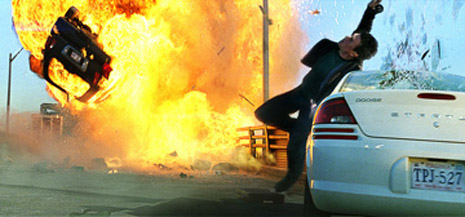Top 10 Film Industry Stories of 2006 #5: Tom Cruise Goes Off on His Own
By Joel Corcoran
January 2, 2007
BoxOfficeProphets.com

Cruise had little to say about the break-up, but Redstone threw quotes at the press like a drunken frat boy throwing beads during Mardi Gras. Some of his choicer statements included:
-- "It's nothing to do with his acting ability, he's a terrific actor. But we don't think that someone who effectuates creative suicide and costs the company revenue should be on the lot."
-- "As much as we like him personally, we thought it was wrong to renew his deal."
-- "[Tom Cruise's] recent conduct has not been acceptable to Paramount."
Apparently, Redstone was so focused on Cruise that he overlooked Paramount chief Brad Grey's involvement in the seedy Anthony Pellicano scandal. Producer Vincent Zenga had filed suit against Grey earlier in the year alleging that Grey hired Pellicano to wiretap Zenga's phones and spy on his family. We aren't quite sure what to make of Redstone's decision, other than Paramount apparently rewards strong-armed intimidation but punishes public disparagement of Brook Shields.
Paula Wagner, Cruise's business partner since 1993 (Cruise/Wagner Productions), offered up weak defenses against Redstone's decision, but couldn't deflect attention away from Cruise. Her most powerful response was "Paramount has chosen to negotiate in the press," calling Redstone's comments about Cruise "undignified, outrageous and untrue." Hollywood players using the press to sway public opinion? Say it isn't so!
While such a blow would stagger most Hollywood stars, Cruise bounced right back. In November 2006, he and Wagner announced they were partnering with Metro-Goldwyn-Mayer (MGM) to take over United Artists. Wagner was named as CEO of the "new United Artists, but Cruise became only a part-owner of the new company with no official title and little history with the company (other than starring in UA's 1988 film Rain Man).
UA's golden age was a few decades ago when it was putting out movies like Midnight Cowboy, The Long Goodbye, Rocky, The Pink Panther, and the early James Bond films. But the studio has been on an upswing the past few years with Hotel Rwanda and partnering with Sony Classics on Capote a year ago. The biggest beneficiary of the deal may be MGM, however.
Under the terms of the deal, UA will supply MGM with four films a year and perhaps more in the future. MGM's financial stake will be limited to worldwide marketing and distribution. The much riskier and substantial costs of actually making the films will be born by other investors. Additionally, MGM's press release announcing the deal said that Cruise and Wagner will have control of setting the company's production slate, from development to production greenlighting ability, subject to certain parameters," yet no one outside MGM/UA knows what these "certain parameters" are. Apparently, MGM negotiated the right to control production - at least to some extent - without obligating itself to paying any costs of production. Essentially, MGM would risk nothing, other than its ownership stake in UA.
MGM might have gotten a sweetheart of a deal, but Cruise and Wagner have created an arrangement with immense potential, which could turn out to be one of the most important Hollywood deals of the decade. Cruise's star power and fan base may be fading, but he and Wagner are shrewd and talented producers. If they can fulfill the promises of MGM's press release and "return the studio to its former roots by recognizing what made UA great in the first place - studio management by creative talent who can best encourage and support other creative talent," then UA could emerge as one of the top studios in Hollywood and a leading contender against the studio that spurned them, Paramount.